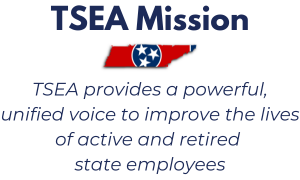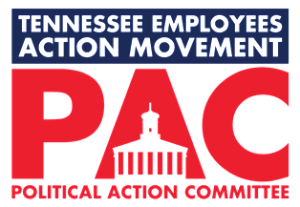TSEA attends all 2013 Budget Hearings, State Group Insurance meetings, DOHR meetings, and meetings with many other state departments and officials.
The end of 2012 was a very productive time for your Association. Over the course of the last two months, TSEA has worked hard evaluating proposed plans from the Governor’s administration for the coming year, conducting and attending meetings with your commissioners and elected government officials and analyzing and discussing all that 2013 has in store for state employees. As always, TSEA ensured that your interests were a part of each of these important high-level discussions, and we made our presence known to those who make the decisions that affect you. The following is a brief summary of the meetings TSEA attended or conducted on your behalf over the last two months and the general discussions that took place. As more information becomes available, look for updates on our website and, if you are on our email list, in your inbox.
Governor’s Budget Hearings (November 6, 7, and 13):
Proposed budget presentations were made to the Governor by: Departments of Safety, Tourist Development, Military, Veterans Affairs, Agriculture, Education, Environment and Conservation, Health, Revenue, Mental Health and Substance Abuse, Commerce and Insurance, Human Services, General Services, Transportation, Correction, and Economic and Community Development, as well as Higher Education, the Tennessee Bureau of Investigation, and the Bureau of TennCare. The Governor had asked each Department to present a worst-case-scenario budget with an overall 5% reduction over the previous year’s budget. The Governor made it clear that it was unlikely that the 5% cuts would have to be enacted. In fact, more revenue is likely to be available than was the case in the present budget cycle. Although the worst-case-scenario budgets contained many position reductions, this was not the case with the department’s more realistic budget requests. Some departments are actually requesting position increases. The Governor will consider these budget proposals and will present his own overall state budget proposal to the General Assembly in his annual State-of-the-State Address at 6pm on Monday, January 28, 2013.
November 15, 2012:
Executive Director O’Connell and Government Affairs Director Adair (along with top officials from the Tennessee Education Association) met with Tennessee Treasurer David Lillard to discuss the present status and the future of the Tennessee Consolidated Retirement System. Treasurer Lillard also met with the TSEA Board of Directors on January 11 to discuss the same subject. The information coming out of these meetings will be shared with the membership on the TSEA website soon.
November 28, 2012:
Executive Director O’Connell and Employee Rights Manager Davis-Davis met with Department of Veteran Affairs Commissioner Many-Bears Grinder to discuss personnel plans for the coming year generally and plans for the privatization of care and upkeep of all of Tennessee’s Veterans Cemeteries. Commissioner Grinder stated that the privatization was necessitated by problems with obtaining reliable equipment and personnel.
December 5, 2012:
Executive Director O’Connell and Government Affairs Director Adair met with DHS Commissioner Hatter to discuss the Department’s budget for the coming year.
December 11, 2012:
Executive Director O’Connell, Comp and Benefits Manager Tuttle, and Comp and Benefits Coordinator Robb attended the meeting of the State Insurance Committees (the ED is a voting member of that committee). The following contains some of the many points discussed during that meeting.
Diabetes Prevention Pilot Program
As a further resource to help maintain or reduce costs to plan members and the state, at the December 2012 meeting of the State Insurance Committees, Benefits Administration recommended to the committee approval to incorporate the Diabetes Prevention Program (DPP) as a pilot for members of the state employee health plan. The DPP was established by the Centers for Disease Control and Prevention (CDC). Rationale for this plan is based on actual State health plan data:
• There are over 26,000 pre-diabetics in the state employee health plan
• Those with a diagnosis of diabetes have costs almost 3x those without
• Moving from pre-diabetes to diabetes almost doubles the cost of care; 1.8x
• Morbidly obese members cost almost 3 times as much as overweight to normal weight members
• Costs for obese members are 34% higher than for those who are overweight to normal weight
• At a cost to the state plan of $29 million in 2011 for diabetes care, it is an expensive disease.
• Nationally, in 2007, $174 billion was spent on total costs for diabetes care
A national clinical study showed that persons with pre-diabetes who lose only 5% to 7% of their body weight and get 150 minutes of moderate physical activity per week can reduce their chances of developing Type 2 diabetes by 58%. This study, funded by the National Institute of Diabetes & Digestive & Kidney Diseases, involved 27 clinics across the nation with results published in the New England Journal of Medicine.
Plan members identified as “pre-diabetic” are the pool from which participants would be selected and group nutrition and weight management counseling will be provided. The anticipated contract start date would be in the second quarter of 2013. The committee voted and approved this request.
ParTNers for Health (PFH) Employee Clinic for State Plan
Also at this same meeting, BA recommended Insurance Committee approval to issue a request for proposal (RFP) for management of the ParTNers for Health Employee Clinic (formerly the State Employee Health Clinic) for State Plan members, with the potential to expand to additional locations.
Based on actuarial assessment findings, services provided by the clinic saves the state money and expanding the services to include wellness coaching will increase these savings. Access to clinic services was limited to plan members in July 2012 when the clinic was renamed the ParTNers for Health Employee Clinic. BA renovated an empty office in the clinic and will start wellness coaching using Healthways staff and EAP counseling in early 2013.
December 13, 2012:
Executive Director O’Connell, Government Affairs Director Adair, Employee Rights Manager Davis-Davis, and Communications Coordinator Clelland met with Human Resources Commissioner Rebecca Hunter, Special Assistant to the Governor Larry Martin, and several members of the Commissioner’s staff as a part of ongoing discussions regarding the implementation of the TEAM Act and other matters. The following contains some of the many points discussed during that meeting.
Appeals & Mediations
Among the items discussed were concerns regarding the way the new Level One Appeals are being conducted throughout the state, which are contrary to how the Department of Human Resources envisioned hearings under the TEAM Act. From the way the rooms are laid out to whether or not TSEA representatives are allowed to be in the room to support the employee, we brought our concerns to Commissioner Hunter’s attention and she agreed that action needed to be taken to protect the employees. TSEA was assured that Hearing Officers will undergo extensive training with updated information reflecting the rules agreed upon by DOHR and TSEA in October 2012, to ensure procedure is followed properly and employees are not subject to intimidation tactics.
Performance Evaluations
TSEA discussed many of the recurring issues we have encountered through your communications to Project TEAMWork to inform DOHR of problems that still need to be addressed or addressed by different means. Commissioner Hunter informed us that Interim Reviews are meant to be conversational, with no formal 1-5 scores given for performance. The purpose of this is for Interims to serve as coachable moments where supervisors work with employees to help them meet their Job Performance Plan specifications as well as gain insight into what the employee may be doing day-to-day that may go above and beyond or fulfill JPP goals in another way.
Commissioner Hunter also assured us that DOHR is working to more clearly define the 1-5 scale so agencies are better able to write Job Performance Plans that are truly SMART and fair to employees. They expressed concern over some agencies still holding employees to a 100% standard for a 3, and are working to identify these agencies and help them revise goals.
Assistant Commissioner Barnes also informed TSEA that scores of 1 or 5 on the formal Performance Evaluation (due June 30, 2013) do need to be approved of by the Appointing Authority, but that no agency should be refusing to give employees above a 3 for fear of unwanted attention on the office or department. DOHR wants to see employees with 4’s and 5’s and likewise, wants employees who have earned 4’s and 5’s to be recognized for their dedication and hard work by receiving those scores and the yet-to-be-determined Merit Pay incentives later.
Most importantly, Commissioner Hunter and Larry Martin, Governor Haslam’s appointed officer to oversee the implementation of the TEAM Act, agreed with TSEA that so long as either side has any reservations about the new Performance Management system or its objectivity and effectiveness, the Performance Evaluations due June 30, 2013 will NOT be used to determine across-the-board raises or Merit Pay. Mr. Martin stated that 2012-2013 is a year to learn from this process and to ensure that the system is being implemented fairly and effectively before fully using Performance Evaluation scores as intended by the TEAM Act.
Salary Study Status
DOHR updated TSEA that the Salary Study, as funded in last year’s state budget and proposed by Governor Haslam, is expected to be completed by late February or early March. The study has been revised and will now include not only salary comparisons with the private sector, but also comparisons of benefit packages. In the end, the study will be a comprehensive look at how the salary and benefits in a state job classification compare with a similar classification in the private sector.
Reductions in Force
Commissioner Hunter reported to us that there are no RIFs on the horizon in the state of Tennessee and that DOHR has been recommending to departments that they stand down on RIFs for the immediate future. Please note that Commissioner Hunter’s recommendation is separate from any possible budget-related RIFs that could be announced in Governor Haslam’s FY2013-2014 Budget. TSEA will have more information regarding this year’s budget in the coming weeks.
December 14, 2013:
Executive Director O’Connell attended the year-end meeting of the State Funding Board (Gov. Haslam, Secretary of State Hargett, Treasurer Lillard, Comptroller Wilson, and F&A Commissioner Emkes). In addition to their other duties, the Board is charged with providing the Governor with an estimated range of the revenues expected for the coming fiscal year. The Governor and the legislature then make use of that estimate in preparing the next state budget. The Board heard forecasts from the Regional Vice-President of the Federal Reserve and from noted economists from MTSU and UT Knoxville. They received resulting estimates of 2013-14 state revenue growth of 2.29% (Tenn Dept. of Revenue) and 2.82% (Fiscal Review Committee).















